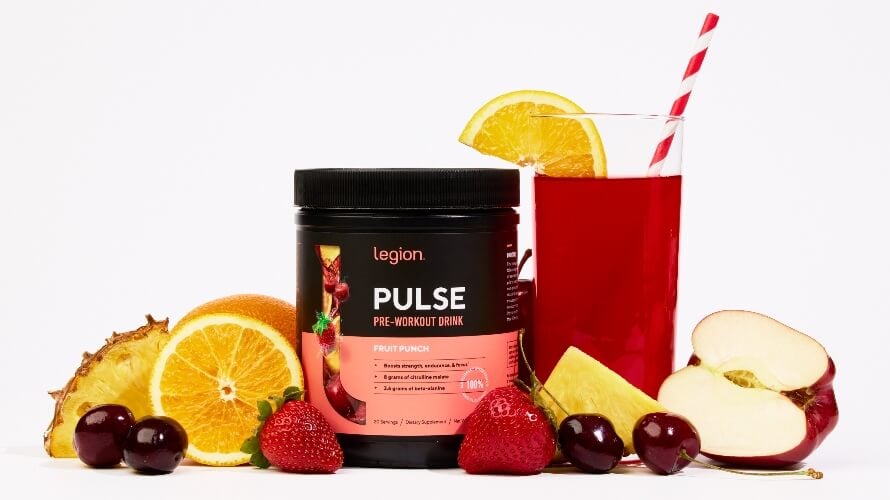Pre-workout often kicks in inside 30-to-60 minutes.
That’s, analysis on widespread pre-workout substances reveals they enhance efficiency most when taken inside an hour of train.
Nevertheless, caffeine—the ingredient with the most important influence on efficiency—can take roughly time to kick in relying on what you’ve eaten, the kind of complement, and your sensitivity to it.
On this article, we’ll break down what impacts how lengthy pre-workout takes to kick in—and find out how to time it for the very best outcomes.
Key Takeaways
- Pre-workout often kicks in inside 30-to-60 minutes.
- Caffeine is the most important variable in how lengthy pre-workout takes to kick in. Whereas it usually peaks round 60 minutes after ingestion, elements like what you’ve eaten, the kind of complement, and your sensitivity can have an effect on while you really feel it.
- How you’re taking pre-workout impacts its onset. Caffeinated gum kicks in quickest (5-to-Quarter-hour), liquids like vitality drinks take in extra rapidly than capsules, and pre-workout hits sooner on an empty abdomen.
- Dosage and expiration don’t change kick-in time. Taking too little caffeine simply means you gained’t really feel the results, however it gained’t delay absorption. An expired pre-workout could also be weaker however nonetheless kicks in inside 30-to-60 minutes.
- You’ll know pre-workout has kicked in while you really feel extra alert, centered, and bodily prepared.
Elements Affecting How Lengthy It Takes Pre-Exercise to Kick In


Whereas most pre-workout substances take 30-to-60 minutes to kick in, a number of elements affect precisely while you really feel their results. A few of these elements influence all substances, whereas others primarily have an effect on caffeine.
The Contents of Your Digestive System
What’s in your digestive system impacts how rapidly your physique processes pre-workout substances, which may alter how quickly they kick in.
Taking it with a big meal (particularly one excessive in carbohydrates), a thick drink like a smoothie or milk, or a big amount of liquid can sluggish digestion, which means it takes longer to really feel its results. This is applicable to all substances, particularly caffeine.
Abdomen pH may also influence how your physique absorbs some substances, although the precise influence varies by ingredient.
In order for you pre-workout to kick in sooner, taking it just a few hours after consuming with simply water is often your greatest guess.
Particular person Variability
Your physique breaks down caffeine utilizing an enzyme referred to as CYP1A2, however not everybody metabolizes it on the similar pace.
Some individuals have a genetic variation that permits them to clear caffeine sooner, which means it leaves their system extra rapidly. Others course of it extra slowly, so caffeine’s results linger for longer.
Genetics additionally affect “caffeine sensitivity,” which impacts how intensely somebody feels caffeine’s results. For a extremely delicate particular person, it could look like caffeine kicks in sooner or lasts longer than it really does.
Nevertheless, caffeine absorption follows a reasonably constant timeline for everybody—what varies is how rapidly individuals really feel and course of its results primarily based on metabolism and sensitivity.
Supply Type
How you’re taking pre-workout impacts how rapidly it kicks in.
Caffeine in pre-workout chewing gum works sooner than pre-workout capsules or capsules as a result of some caffeine is taken up by way of the mouth’s lining, bypassing digestion. This implies you would possibly really feel the results in as little as 5-to-Quarter-hour.
Liquid kinds—like pre-workout, vitality drinks, and occasional—additionally take in sooner than capsules, particularly on an empty abdomen.
Elements That Don’t Have an effect on How Lengthy it Takes Pre-Exercise to Kick In
Some elements would possibly look like they’d change how rapidly pre-workout kicks in, however they don’t really make a distinction. Two of the commonest misconceptions are dosage and expiration:
- Dosage: Smaller doses don’t take longer to kick in—they simply won’t work in any respect. For those who take too little caffeine or different energetic substances, you might not really feel any noticeable results, however the absorption charge stays the identical.
- Expiration: Utilizing an expired pre-workout could scale back its efficiency, however it doesn’t change how briskly it kicks in. Components like caffeine, beta-alanine, and L-theanine nonetheless comply with the identical absorption timeline—often 30-to-60 minutes—even when they’re weaker because of age.
How you can Know Your Pre-Exercise Has Kicked In


You’ll know your pre-workout has began working while you really feel a rise in vitality, focus, and bodily readiness.
For most individuals, the primary signal is heightened alertness from caffeine, which may make you’re feeling extra awake and mentally sharp. In case your pre-workout incorporates beta-alanine, you may additionally expertise a tingling sensation in your pores and skin—a innocent impact referred to as paresthesia.
Because it absolutely kicks in, you might discover your coronary heart charge rise, your muscle tissue really feel extra “pumped,” and your fatigue fade.
What’s the Finest Pre-Exercise?


In order for you a 100% naturally flavored and sweetened pre-workout complement containing clinically efficient doses of 6 performance-boosting substances like caffeine, citrulline malate, and beta-alanine, attempt Legion’s pre-workout powder, Pulse.
(For those who’re unsure whether or not Pulse fits your wants and funds, take the Legion Complement Finder Quiz to be taught what dietary supplements are best for you. Click on right here to test it out.)
FAQ #1: How lengthy does pre-workout take to kick in on an empty abdomen?
Pre-workout kicks in sooner on an empty abdomen, usually inside half-hour.
Nevertheless, taking pre-workout on an empty abdomen could trigger jitters, nausea, or upset your abdomen, particularly should you’re delicate to caffeine. If that’s the case, a small snack or a lighter meal could assist scale back the downsides.
FAQ #2: How lengthy does pre-workout take to kick in should you drink it slowly?
Consuming pre-workout slowly gained’t considerably change how lengthy it takes to kick in.
Caffeine and different energetic substances begin absorbing as quickly as they attain your intestines, so whether or not you drink it rapidly or sip it over a brief interval, the entire absorption time stays about 30-to-60 minutes. Nevertheless, should you take too lengthy to complete it—say, an hour—you won’t really feel the total results unexpectedly.
In order for you pre-workout to hit on the proper time, it’s greatest to drink it inside a couple of minutes moderately than sipping it slowly.
FAQ #3: How lengthy does stim-free pre-workout take to kick in?
Stim-free pre-workout takes about the identical time to kick in as common pre-workout—usually 30-to-60 minutes.
Because it doesn’t include caffeine or different stimulants, you gained’t really feel the identical sudden enhance in vitality or alertness. As a substitute, substances like citrulline malate, beta-alanine, and betaine work extra progressively by boosting power, growing endurance, and lowering fatigue.
For a stim-free pre-workout containing clinically efficient doses of 4 substances scientifically proven to extend power and stamina and scale back fatigue and with out the jitters, upset abdomen, or post-workout crash, attempt stim-free Pulse.
Scientific References +
- Visitor, Nanci S., et al. “Worldwide Society of Sports activities Vitamin Place Stand: Caffeine and Train Efficiency.” Journal of the Worldwide Society of Sports activities Vitamin, vol. 18, no. 1, 2 Jan. 2021, https://doi.org/10.1186/s12970-020-00383-4.
- Keller, J. “Gastrointestinal Digestion and Absorption.” Encyclopedia of Organic Chemistry, 2013, pp. 354–359, https://doi.org/10.1016/b978-0-12-378630-2.00106-7.
- Alsabri, Sami G., et al. “Kinetic and Dynamic Description of Caffeine.” Journal of Caffeine and Adenosine Analysis, vol. 8, no. 1, Mar. 2018, pp. 3–9, https://doi.org/10.1089/caff.2017.0011.
- Chvasta, T E, and A R Cooke. “Emptying and Absorption of Caffeine from the Human Abdomen.” Gastroenterology, vol. 61, no. 6, Dec. 1971, pp. 838–43, pubmed.ncbi.nlm.nih.gov/5125686/.
- Nehlig, Astrid. “Interindividual Variations in Caffeine Metabolism and Elements Driving Caffeine Consumption.” Pharmacological Critiques, vol. 70, no. 2, 7 Mar. 2018, pp. 384–411, https://doi.org/10.1124/pr.117.014407.
- Fulton, Jacob L., et al. “Affect of Genetic Variability on Physiological Responses to Caffeine in People: A Systematic Assessment.” Vitamins, vol. 10, no. 10, 25 Sept. 2018, www.ncbi.nlm.nih.gov/pmc/articles/PMC6212886/, https://doi.org/10.3390/nu10101373.
- Wickham, Kate A., and Lawrence L. Spriet. “Administration of Caffeine in Alternate Varieties.” Sports activities Drugs, vol. 48, no. S1, 24 Jan. 2018, pp. 79–91, https://doi.org/10.1007/s40279-017-0848-2.








Discussion about this post